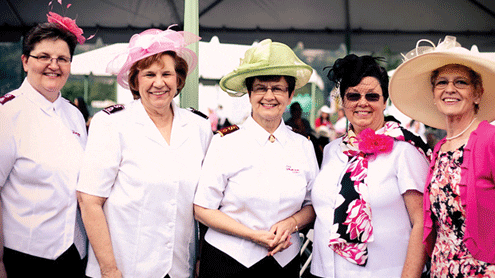Listen to this article
Listen to this article
Loading
Play
Pause
Options
0:00
-:--
1x
Playback Speed- 0.5
- 0.6
- 0.7
- 0.8
- 0.9
- 1
- 1.1
- 1.2
- 1.3
- 1.5
- 2
Audio Language
- English
- French
- German
- Italian
- Spanish
Open text
why should we limit god? by grant sandercock-brown. i have met many people who testify to god’s miraculous intervention in their lives. i know people who have been healed. i have heard people, under the influence of the holy spirit, speak prophetically to their communities. have there been charlatans? yes. have some been too quick to label their own thoughts as a prophecy of god? absolutely. that does not mean that god has stopped working. it just means that we must be discerning. but that has always been the case for the christian family. it’s why paul mentions the gift in his correspondence with “signs and wonders central,” the corinthian church. questions about signs, wonders, prophecy and healing are really questions about the power and presence of the spirit in our times. the church at corinth seems to have experienced far more divine activity than many of us see and experience. but if it’s any comfort, that’s not a recent development. the roots of the difference between corinth and us go back a long way. new testament scholar gordon fee talks about “the general loss of the dynamic and experiential life of the spirit” from the second generation of christians onward. very quickly in the early church spontaneity gave way to formality; the experience of the spirit gave way to the rites of the church. but it’s also why, throughout the history of god’s people, popular movements have risen time and time again where ordinary people, trusting and open to god, are touched and healed and prompted by the spirit. some of these movements have ended up being heretical. but not all. indeed the salvation army was born out of such a movement in the 19th century. often our doubting of signs and wonders comes from our own experience. sometimes with all the faith we can muster (and only a mustard-seed-sized faith is required) we have prayed for healing, revelation and for the spirit’s power. and nothing has happened, at least as far as we can tell. the reality seems to be that on most occasions we ask god for miracles and he asks us for endurance, suffering or hard work. one day, when i see him face to face, i’ll share my view that a few spectacular signs and wonders in my own life would have been really helpful for me and my ministry; that some powerful, fulfilled prophecies and miraculous healings would have, in my opinion, bolstered his credibility. he’ll probably have a good answer for me. so until then i’ll trust god to be god. i’ll believe in signs and wonders and trust the evidence for them that i see around me and never cease praying that the spirit, in a mighty way, will be at work among his people and in his world. captain grant sandercock-brown is corps officer at chatswood, australia eastern territory. from salvationist.ca.
Open context player
Close context player
Plays:-Audio plays count
why should we limit god? by grant sandercock-brown. i have met many people who testify to god’s miraculous intervention in their lives. i know people who have been healed. i have heard people, under the influence of the holy spirit, speak prophetically to their communities. have there been charlatans? yes. have some been too quick to label their own thoughts as a prophecy of god? absolutely. that does not mean that god has stopped working. it just means that we must be discerning. but that has always been the case for the christian family. it’s why paul mentions the gift in his correspondence with “signs and wonders central,” the corinthian church. questions about signs, wonders, prophecy and healing are really questions about the power and presence of the spirit in our times. the church at corinth seems to have experienced far more divine activity than many of us see and experience. but if it’s any comfort, that’s not a recent development. the roots of the difference between corinth and us go back a long way. new testament scholar gordon fee talks about “the general loss of the dynamic and experiential life of the spirit” from the second generation of christians onward. very quickly in the early church spontaneity gave way to formality; the experience of the spirit gave way to the rites of the church. but it’s also why, throughout the history of god’s people, popular movements have risen time and time again where ordinary people, trusting and open to god, are touched and healed and prompted by the spirit. some of these movements have ended up being heretical. but not all. indeed the salvation army was born out of such a movement in the 19th century. often our doubting of signs and wonders comes from our own experience. sometimes with all the faith we can muster (and only a mustard-seed-sized faith is required) we have prayed for healing, revelation and for the spirit’s power. and nothing has happened, at least as far as we can tell. the reality seems to be that on most occasions we ask god for miracles and he asks us for endurance, suffering or hard work. one day, when i see him face to face, i’ll share my view that a few spectacular signs and wonders in my own life would have been really helpful for me and my ministry; that some powerful, fulfilled prophecies and miraculous healings would have, in my opinion, bolstered his credibility. he’ll probably have a good answer for me. so until then i’ll trust god to be god. i’ll believe in signs and wonders and trust the evidence for them that i see around me and never cease praying that the spirit, in a mighty way, will be at work among his people and in his world. captain grant sandercock-brown is corps officer at chatswood, australia eastern territory. from salvationist.ca.
Listen to this article












